新概念英语第一册第49-50课课件 (共75张PPT)
文档属性
| 名称 | 新概念英语第一册第49-50课课件 (共75张PPT) |  | |
| 格式 | ppt | ||
| 文件大小 | 6.5MB | ||
| 资源类型 | 教案 | ||
| 版本资源 | 新概念英语 | ||
| 科目 | 英语 | ||
| 更新时间 | 2023-10-06 13:30:12 | ||
图片预览

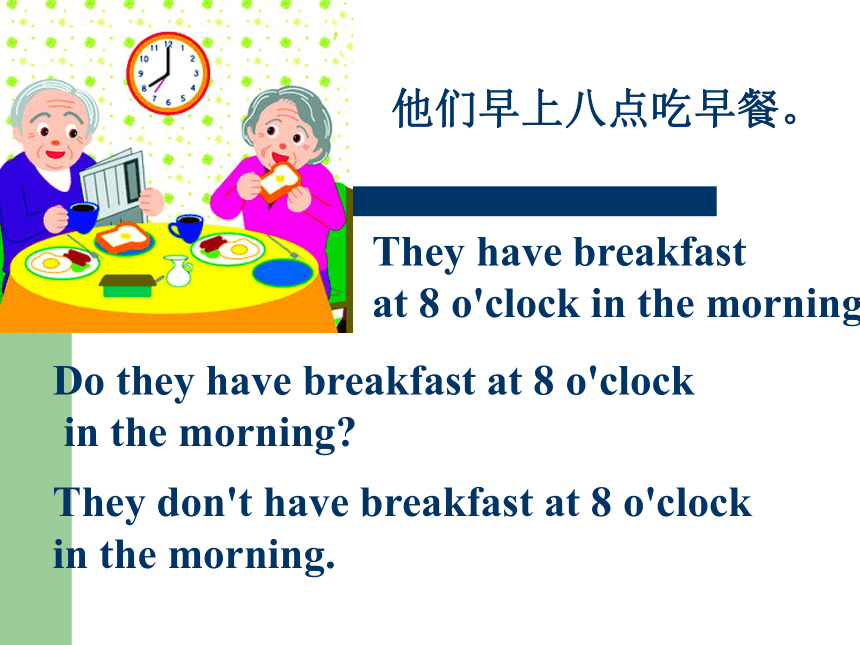




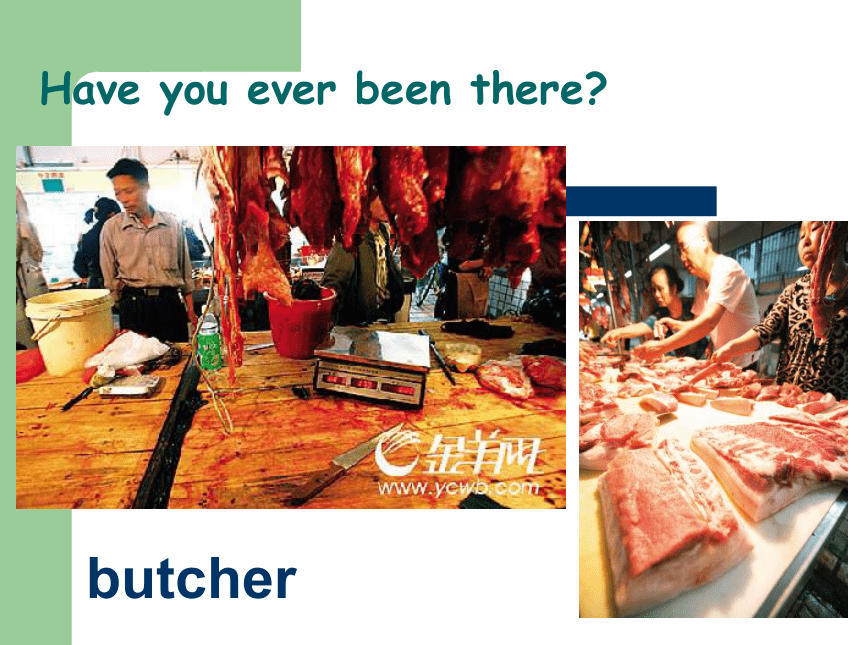

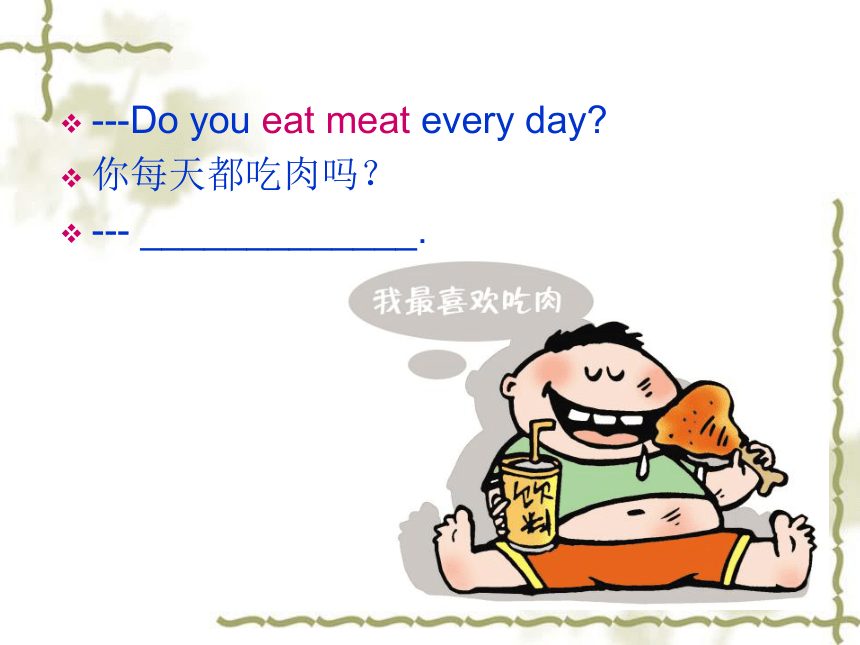
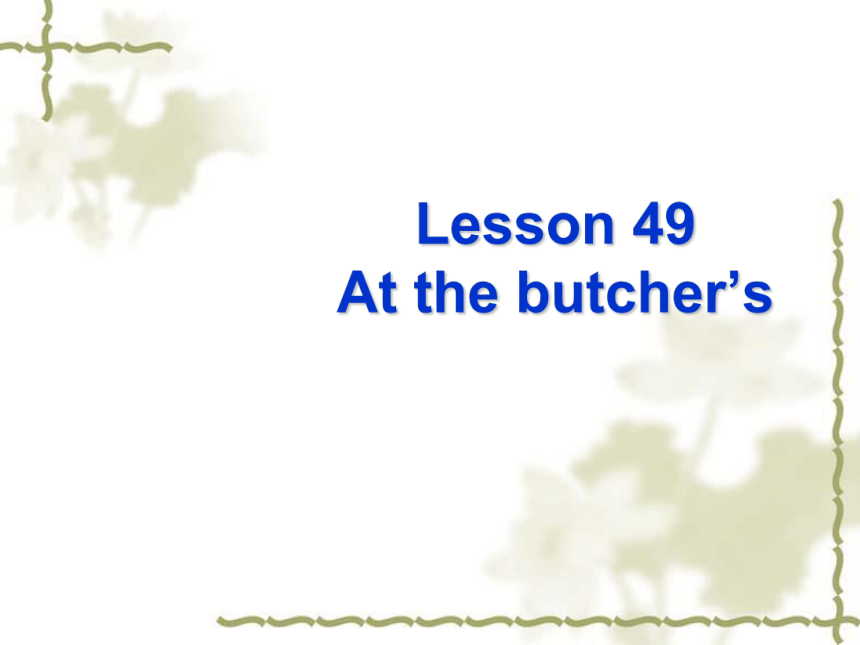
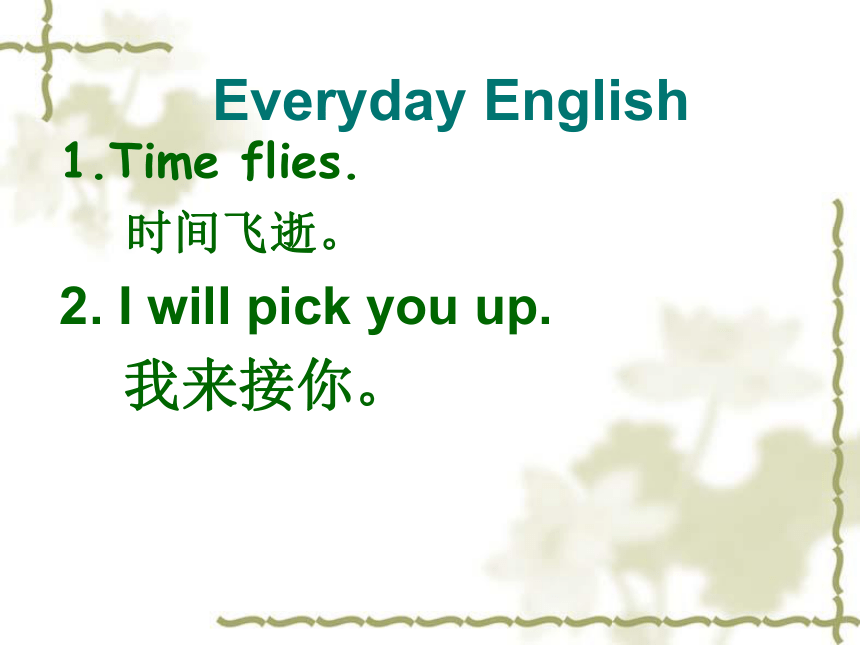
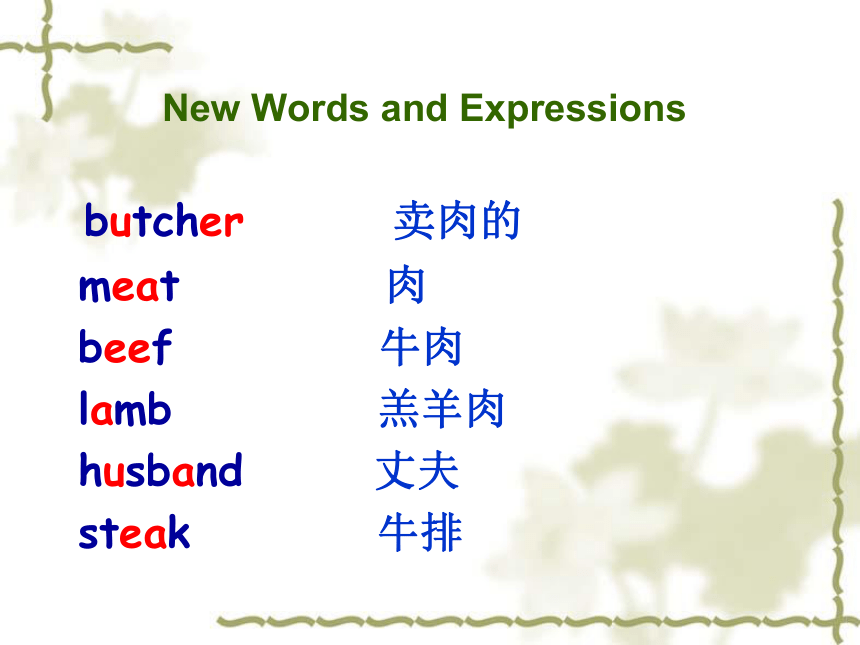
文档简介
(共75张PPT)
Revision
We go to school
on foot everyday.
We don't go to school on foot everyday.
我们每天走路上学。
Do you go to school on foot everyday
他们早上八点吃早餐。
They have breakfast
at 8 o'clock in the morning.
Do they have breakfast at 8 o'clock
in the morning
They don't have breakfast at 8 o'clock
in the morning.
他正在做什么?
What is he doing now
他正在看电影。
He is watching a movie now.
他正在做什么?
What is he doing now
他正在唱歌。
He is singing now.
他们将要去做什么?
What are they going to do
他们将要去爬山。
They're going to climb the mountain.
她将要去做什么?
What is she going to do
她将要去游泳。
She is going to swim.
Have you ever been there
butcher
New Concept English(Book 1)
(新概念英语)(第一册)
---Do you eat meat every day
你每天都吃肉吗?
--- _____________.
Lesson 49
At the butcher’s
Everyday English
1.Time flies.
时间飞逝。
2. I will pick you up.
我来接你。
New Words and Expressions
butcher 卖肉的
meat 肉
beef 牛肉
lamb 羔羊肉
husband 丈夫
steak 牛排
mince 肉馅
chicken 鸡
tell 告诉
truth 实情
either 也
New Words and Expressions
★ butcher n.
a person who sells meat
e.g.: The old man is a butcher .
at the butcher's a place where you can buy meat
egg: The boy is at the butcher's . He wants to buy some meat .
I have to go to the butcher’s.
doctor – doctor’s
在英文表示“某一商店”的商店中,往往可以把shop省略,如课文中的the butcher’s (shop)和the greengrocer’s (shop),类似的例子还有the hairdresser’s (shop),the stationer’s (shop),the doctor’s (office),my mother’s (house)等。
butcher n.屠夫;刽子手(残忍的或滥杀无辜的人)
He is a real butcher!他是嗜杀成性的人。
★ meat 肉(食用)
Do you want any meat
★ beef
★ lamb
★ steak
★ mince
beef n.(UC)
the meat from oxen [’ ks n] or cows
ox和bull的区别
ox指被阉割过的公牛 bull指未被阉割过的
Do you want any beef
There isn’t any beef on the plate.
steak n. (UC)
a piece of steak
steak
---How do you like your steak
你想怎样吃你的牛排?
--- Steak rare/medium/well-done.
生些/五分熟/全熟。
Waiter, this steak is too rare. 服务生,这牛排太生了。
How will you like your steak Rare! 您要怎么做的牛排?嫩些的!
I want my steak medium rare, please. 我要半生的牛排,麻烦你。
Would you like the steak well done or rare 你喜欢牛排煎得透一点,还是略生一点?
lamb n. (uc)
the meat from lambs
e.g.: Do you want beef or lamb
Beef , please .
Lamb , please .
a lovely lamb
a wolf in sheep‘s clothing 披着羊皮的狼, 口蜜腹剑的人
She's as gentle as a lamb.
_______________________________.
The life of the wolf is the death of the lamb.有活的狼就有死的羔羊。
A lamb is as dear to a poor man as an ox to the rich. 穷人的一只羔羊比富人的一头牛还要珍贵。
mince n. (UC)
I want a pound of mince.
Because I want to make some dumplings .
chicken n.
★ chicken n.鸡,鸡肉
cock [k k]公鸡
hen [hen]母鸡
chick [t ik]小鸡
翻译:
1. 房子后面有一些鸡。
2. ---你想吃些什么?
--- 我想吃些鸡肉。
wife
husband
girlfriend
fiancée
bride
wife
housewife
spouse配偶, 夫或妻
复数 spouses
spouse’s date of birth /配偶出生日期
spouse’s place of birth /配偶出生地
boyfriend
fiance
groom
husband
househusband
couple 夫妇,夫妻
★ husband n.老公,丈夫
We are husband and wife.
= We are a couple [‘k pl] 一对.
夫妻之间的称呼:
honey dear
darling sweet
baby
What do you call your husband
★ tell v. 过去式 told
I told you something about my husband just now .
Tell me another. 我不相信你。
You are telling me. 我早就知道这事了!
tell v.告诉,说
to tell you the truth ……说老实话
To tell you the truth , I don't want to tell you this .
To tell you the truth, we can’t lower the price again.
实话说,这个牛排不是很好。
I have been loving you for a long time!
To be frank, =frankly, …
truth n.实情,事实
true adj. 真实的
truly adv. 1. 真正地2. 忠实地, 真诚地
come true 梦想成真
come into reality
true lie 真实的谎言
The truth is … 真相是/事实是…
find out the truth 找到真相
▲say是“讲,说”的意思,强调说话内容。一般作及物动词,常用于直接引述所说的话或间接叙述所说的话。例如: Say it in Chinese please. 请用汉语说。 He says: ″It‘s great.″他说:“好极了。” He says that he saw the man yesterday. 他说他昨天看见这个人了。
My English teacher always says that I’m a good student.
say+ 说话内容
say to sb.
It is said that... 意为“据说”。如:
It is said that he could stay under the water for a long time. 据说他能呆在水里很长时间。
▲ speak作及物动词,意为“说”“讲”,其宾语常是某种语言。如:speak French说法语;
表示说到什么人或事,须用介词about/ of /on引出的短语。如:They all spoke on folk music.
speak也作不及物动词,主要表示说话的本能和方式,发言等。例如: The baby is learning to speak.
speak+ 语言
speak to sb.
speak about/ of/ on sth.
speak of 意为“提到、说起”
speak to [with] sb (about sth)
▲talk意为“讲、谈论,谈话”是不及物动词,常和to with about 连用如: They are talking about the film. 他们正谈论这部电影。 The teacher is talking with Mike. 老师正和迈克谈话。
I want to talk to you.
talk to/ with sb. about sth.
have a talk with 意为“与......交谈”
give a talk做报告 (talk n.报告)
have a talk听报告
talk show 脱口秀
▲tell意为“告诉,对…说”.告诉的内容 可以和to连用 作及物动词,如: I can’t tell the bad news to you.
=I can’t tell you the bad news.
My mother tells me to buy some fruit.
tell the truth 说真话 tell a lie说谎
tell the time “报时“ tell a story讲故事
tell about a person / a game / a success
tell sb. sth./ tell sth. to sb.
tell sb. to do sth.
tell : 辨别,说出区别 tell A from B
tell the differences between A and B
chat 聊天
chat room 聊天室 chitchat闲谈,聊天
have a chitchat 闲聊
video chat 视频聊天
have a chat with sb./chat with sb. 和某人聊天
练习一:
1. Did he _____ it in English
A. tell B. speak C. say D. talk
2. The teacher _____ us to finish the homework in time.
A. tells B. speaks C. says D. talks
3.What would you like to ______ us about your hometown.
A. speak B. talk C. say D. tell
练习二:选用 say speak talk tell的适当形式填空。
1. He ____ he is busy.
2.”What language do you __﹖”
″I ______ Chinese.″
3. The teacher is ____ loudly to the students.
4. She is ____ with her classmates.
5. Please ___ me the news.
★ either adv.
My husband likes steak .
I like steak, too .
=I also like steak .
Do you like steak too
My husband doesn't like chicken
I don't like chicken, either .
I like lamb, too. 我也喜欢小羊肉。
Can I come, too 我也来,行吗?
I, too, have been to Shanghai. 我也到过上海。
either一般用于否定句,位于句末,前面通常有逗号。
too常用于肯定句,有时也用于疑问句,但不能用于否定句。常见于句末,too前常有逗号;如果不在句末,too前后都应当有逗号。
also 用于肯定句中,位于居中
either adv.也(用于否定句)
I don’t like him, either!
She doesn’t like him, me either!
You have a car, me too!
You are single Me too!
Do you want to drink beer too
-你也很喜欢他吗?
-是的。不过Tank不喜欢他,Elaine也不喜欢他。
Translation
1.我要去肉档买些牛排,羊肉和猪肉。
2. 我老公喜欢吃鸡肉,我儿子也喜欢。
3. 老实说,我也不喜欢抽烟。
4. 事实上,我也想去上海。
5. 实话说,我不想去肉档,因为我老婆不喜欢吃肉,我也不喜欢!
Listening
1 What did Mrs. Bird buy
2 Listen to the tape, and then judge the sentences. If it is right, please say yes. If it is wrong, please say no.
Mrs. Bird like lamb.
Mrs. Bird’s husband
like lamb too.
3. Mrs. Bird like chicken.
4.Mrs. Bird doesn’t like chicken.
5. Mrs. Bird’s husband
doesn’t like steak.
Yes
No
Yes
No
No
BUTCHER: Do you want any meat today, Mrs. Bird
MRS.BIRD: Yes, please.
BUTCHER: Do you want beef or lamb
MRS.BIRD: Beef, please.
BUTCHER: This lamb's very good.
MRS.BIRD: I like lamb, but my husband doesn't.
BUTCHER: What about some steak
This is a nice piece.
MRS.BIRD: Give me that piece, please.
MRS.BIRD: And a pound of mince, too.
BUTCHER: Do you want a chicken, Mrs. Bird
They 're very nice.
MRS.BIRD: No, thank you.
MRS.BIRD: My husband likes steak, but he doesn't like chicken.
BUTCHER: To tell you the truth, Mrs. Bird,
I don't like chicken either!
At the butcher’s
方位副词at与in的区别是,at和in在…里;但at表示的地方较小,而in表示的地方很大,例:
at the school
at home
in China
in Asia
in Changzhou
Detailed study about the passage
Do you want beef or lamb
or 或者,还是(表示选择)
Do you want beer or wine
Beer , please .
Wine , please .
Do you want an apple or a banana
An apple , please .
A banana , please .
Do you want tomatoes or potatoes
Truth or dare! 真心话大冒险(a game)
要钱要命?!
你要可乐还是白开水(plain boiled water) ?
选择疑问句的例句如:
What would you like to drink 你喜欢喝什么?(无限性选择)
Which/What would you prefer, tea or coffee 茶和咖啡,你喜欢哪一种?(两项选择)
Would you like tea, coffee, or milk 你喜欢茶、咖啡、还是牛奶?(3项选择)
How shall we go, by bus or by train 我们怎么走?乘公共汽车还是坐火车?
Did you go there, or didn't you 你去了那儿还是没有去?
Did you or didn't you go there 你是去了还是没有去那儿?
What about some steak
来点牛排怎么样?
=How about 怎么样?/如何?
You look blue, how about watching a movie together
-You don’t like beef What about pork Or lamb
He is going to dance, how about you
搞个聚会怎么样?
What about him
What about tomorrow
How about watching TV
What about playing football
To tell you the truth,
I don’t like chicken, either.
动词不定式作插入语,所谓动词不定式就是to +verb.的形式
动词不定式不可以作谓语,但可做其它句子成份。例:
To say is one thing, to do is another thing. 说一套做一套。(动词不定式作主语)
To be or not to be, that’s a question.
生存还是毁灭?这是个问题。 ---Shakespeare
实话说,他真的很笨哦!
其实,我也不喜欢吃鱼。
Grammar
助动词 do, does
在英语中,助动词一般没有词义,主要帮助构成谓语,表示时态,语态或构成疑问及否定。
do :主语为 I, you及复数时。
do not = don’t (否定形式)
does :主语为第三人称单数时。
does not = doesn’t (否定形式)
1.我喜欢Tank.
I like Tank.
2. 她喜欢Tank.
She likes Tank.
3. 我不喜欢Sonic.
I don’t like Sonic.
4. 她不喜欢Sonic.
She doesn’t like Sonic.
don’t = do not
doesn’t = does not
5. 你喜欢Tank吗?
她喜欢Tank 吗?
Do you like Tank
Does she like Tank
肯定句
主语+动词~
我每天说英语。
I speak English every day.
他每天说英语。
He speaks English every day.
注:主语是第三人称单数时,动词要加s,或es
否定句
主语+don’t / doesn’t +动词~
在助动词后加not
我不是每天说英语。
I don’t speak English every day.
他不是每天说英语。
He doesn’t speak English every day.
疑问句将助动词提前
Do / Does + 主语+动词~
你每天说英语吗?
Do you speak English every day
他每天说英语吗 ?
Does he speak English every day
我喜欢牛奶。
我不喜欢牛奶。
他喜欢苹果。
他不喜欢苹果。
1. I like milk.
2. I don’t like milk.
3. He likes apples.
4. He doesn’t like apples.
你有钱吗?
她有钱吗?
他们有手机吗?
你们有书吗?
1. Do you have money
2. Does she have money
3. Do they have cell phones
4. Do you have books
Lesson 50
He likes…
but he doesn’t like…
On TV. My classmate , Frank is really cool.
New Words and Expressions
tomato 西红柿
potato 土豆
cabbage 卷心菜
lettuce 莴苣
pea 豌豆
bean 豆角
pear 梨
grape 葡萄
peach 桃
Exercise: 用动词适当形式填空
1. __you __(clean) your classroom now
Yes, we __(be). We __(clean) it every day.
2. __he often __(watch) TV
Yes, he __.He____(like) watching TV.
3. __ they __ (have) lunch now
4.___they ___(have) lunch at 12 everyday
5. Can you __(answer) the question in English
Exercise: 用too或either填空
1. I can speak English and he can, __.
2. Does the butcher like chicken No, he doesn’t, ___.
3. Jane is watching TV now and her brother is watching, __.
4. There is some water in the glass and in the cup, __.
5. I don’t know how to repair a radio. My brother doesn’t __.
Survey
Ask me questions, get to know what I like, and don’t like.
Begin with:
Hi, I’m Stella. Do you like ____
What do you like and don’t like
练习答案 Key to written exercises
A
1 He likes coffee, but I don't.
2 She likes tea, but he doesn't.
3 He is eating some bread, but she isn't.
4 She can type very well, but he can't.
5 They are working hard, but we aren't.
6 He is reading a magazine, but I am not.
B
1 Yes, he does.
He likes cabbage, but he doesn't want any.
2 Yes, he does.
He likes lettuce, but he doesn't want any.
3 Yes, I do.
I like peas, but I don't want any.
4 Yes, she does.
She likes beans, but she doesn't want any.
5 Yes, I do.
I like bananas, but I don't want any.
6 Yes, he does.
He likes oranges, but he doesn't want any.
7 Yes, he does.
He likes apples, but he doesn't want any.
8 Yes, she does.
She likes pears, but she doesn't want any.
9 Yes, I do.
I like grapes, but I don't want any.
10 Yes, she does.
She likes peaches, but she doesn't want any.
Assignments:
1. 用第49-50课词汇表中的每一个单词造一个句子;
2.听写并背诵第49课课文;
3.完成练习册第49课、第50课;
4. 完成PPT33,34上的习题。
Revision
We go to school
on foot everyday.
We don't go to school on foot everyday.
我们每天走路上学。
Do you go to school on foot everyday
他们早上八点吃早餐。
They have breakfast
at 8 o'clock in the morning.
Do they have breakfast at 8 o'clock
in the morning
They don't have breakfast at 8 o'clock
in the morning.
他正在做什么?
What is he doing now
他正在看电影。
He is watching a movie now.
他正在做什么?
What is he doing now
他正在唱歌。
He is singing now.
他们将要去做什么?
What are they going to do
他们将要去爬山。
They're going to climb the mountain.
她将要去做什么?
What is she going to do
她将要去游泳。
She is going to swim.
Have you ever been there
butcher
New Concept English(Book 1)
(新概念英语)(第一册)
---Do you eat meat every day
你每天都吃肉吗?
--- _____________.
Lesson 49
At the butcher’s
Everyday English
1.Time flies.
时间飞逝。
2. I will pick you up.
我来接你。
New Words and Expressions
butcher 卖肉的
meat 肉
beef 牛肉
lamb 羔羊肉
husband 丈夫
steak 牛排
mince 肉馅
chicken 鸡
tell 告诉
truth 实情
either 也
New Words and Expressions
★ butcher n.
a person who sells meat
e.g.: The old man is a butcher .
at the butcher's a place where you can buy meat
egg: The boy is at the butcher's . He wants to buy some meat .
I have to go to the butcher’s.
doctor – doctor’s
在英文表示“某一商店”的商店中,往往可以把shop省略,如课文中的the butcher’s (shop)和the greengrocer’s (shop),类似的例子还有the hairdresser’s (shop),the stationer’s (shop),the doctor’s (office),my mother’s (house)等。
butcher n.屠夫;刽子手(残忍的或滥杀无辜的人)
He is a real butcher!他是嗜杀成性的人。
★ meat 肉(食用)
Do you want any meat
★ beef
★ lamb
★ steak
★ mince
beef n.(UC)
the meat from oxen [’ ks n] or cows
ox和bull的区别
ox指被阉割过的公牛 bull指未被阉割过的
Do you want any beef
There isn’t any beef on the plate.
steak n. (UC)
a piece of steak
steak
---How do you like your steak
你想怎样吃你的牛排?
--- Steak rare/medium/well-done.
生些/五分熟/全熟。
Waiter, this steak is too rare. 服务生,这牛排太生了。
How will you like your steak Rare! 您要怎么做的牛排?嫩些的!
I want my steak medium rare, please. 我要半生的牛排,麻烦你。
Would you like the steak well done or rare 你喜欢牛排煎得透一点,还是略生一点?
lamb n. (uc)
the meat from lambs
e.g.: Do you want beef or lamb
Beef , please .
Lamb , please .
a lovely lamb
a wolf in sheep‘s clothing 披着羊皮的狼, 口蜜腹剑的人
She's as gentle as a lamb.
_______________________________.
The life of the wolf is the death of the lamb.有活的狼就有死的羔羊。
A lamb is as dear to a poor man as an ox to the rich. 穷人的一只羔羊比富人的一头牛还要珍贵。
mince n. (UC)
I want a pound of mince.
Because I want to make some dumplings .
chicken n.
★ chicken n.鸡,鸡肉
cock [k k]公鸡
hen [hen]母鸡
chick [t ik]小鸡
翻译:
1. 房子后面有一些鸡。
2. ---你想吃些什么?
--- 我想吃些鸡肉。
wife
husband
girlfriend
fiancée
bride
wife
housewife
spouse配偶, 夫或妻
复数 spouses
spouse’s date of birth /配偶出生日期
spouse’s place of birth /配偶出生地
boyfriend
fiance
groom
husband
househusband
couple 夫妇,夫妻
★ husband n.老公,丈夫
We are husband and wife.
= We are a couple [‘k pl] 一对.
夫妻之间的称呼:
honey dear
darling sweet
baby
What do you call your husband
★ tell v. 过去式 told
I told you something about my husband just now .
Tell me another. 我不相信你。
You are telling me. 我早就知道这事了!
tell v.告诉,说
to tell you the truth ……说老实话
To tell you the truth , I don't want to tell you this .
To tell you the truth, we can’t lower the price again.
实话说,这个牛排不是很好。
I have been loving you for a long time!
To be frank, =frankly, …
truth n.实情,事实
true adj. 真实的
truly adv. 1. 真正地2. 忠实地, 真诚地
come true 梦想成真
come into reality
true lie 真实的谎言
The truth is … 真相是/事实是…
find out the truth 找到真相
▲say是“讲,说”的意思,强调说话内容。一般作及物动词,常用于直接引述所说的话或间接叙述所说的话。例如: Say it in Chinese please. 请用汉语说。 He says: ″It‘s great.″他说:“好极了。” He says that he saw the man yesterday. 他说他昨天看见这个人了。
My English teacher always says that I’m a good student.
say+ 说话内容
say to sb.
It is said that... 意为“据说”。如:
It is said that he could stay under the water for a long time. 据说他能呆在水里很长时间。
▲ speak作及物动词,意为“说”“讲”,其宾语常是某种语言。如:speak French说法语;
表示说到什么人或事,须用介词about/ of /on引出的短语。如:They all spoke on folk music.
speak也作不及物动词,主要表示说话的本能和方式,发言等。例如: The baby is learning to speak.
speak+ 语言
speak to sb.
speak about/ of/ on sth.
speak of 意为“提到、说起”
speak to [with] sb (about sth)
▲talk意为“讲、谈论,谈话”是不及物动词,常和to with about 连用如: They are talking about the film. 他们正谈论这部电影。 The teacher is talking with Mike. 老师正和迈克谈话。
I want to talk to you.
talk to/ with sb. about sth.
have a talk with 意为“与......交谈”
give a talk做报告 (talk n.报告)
have a talk听报告
talk show 脱口秀
▲tell意为“告诉,对…说”.告诉的内容 可以和to连用 作及物动词,如: I can’t tell the bad news to you.
=I can’t tell you the bad news.
My mother tells me to buy some fruit.
tell the truth 说真话 tell a lie说谎
tell the time “报时“ tell a story讲故事
tell about a person / a game / a success
tell sb. sth./ tell sth. to sb.
tell sb. to do sth.
tell : 辨别,说出区别 tell A from B
tell the differences between A and B
chat 聊天
chat room 聊天室 chitchat闲谈,聊天
have a chitchat 闲聊
video chat 视频聊天
have a chat with sb./chat with sb. 和某人聊天
练习一:
1. Did he _____ it in English
A. tell B. speak C. say D. talk
2. The teacher _____ us to finish the homework in time.
A. tells B. speaks C. says D. talks
3.What would you like to ______ us about your hometown.
A. speak B. talk C. say D. tell
练习二:选用 say speak talk tell的适当形式填空。
1. He ____ he is busy.
2.”What language do you __﹖”
″I ______ Chinese.″
3. The teacher is ____ loudly to the students.
4. She is ____ with her classmates.
5. Please ___ me the news.
★ either adv.
My husband likes steak .
I like steak, too .
=I also like steak .
Do you like steak too
My husband doesn't like chicken
I don't like chicken, either .
I like lamb, too. 我也喜欢小羊肉。
Can I come, too 我也来,行吗?
I, too, have been to Shanghai. 我也到过上海。
either一般用于否定句,位于句末,前面通常有逗号。
too常用于肯定句,有时也用于疑问句,但不能用于否定句。常见于句末,too前常有逗号;如果不在句末,too前后都应当有逗号。
also 用于肯定句中,位于居中
either adv.也(用于否定句)
I don’t like him, either!
She doesn’t like him, me either!
You have a car, me too!
You are single Me too!
Do you want to drink beer too
-你也很喜欢他吗?
-是的。不过Tank不喜欢他,Elaine也不喜欢他。
Translation
1.我要去肉档买些牛排,羊肉和猪肉。
2. 我老公喜欢吃鸡肉,我儿子也喜欢。
3. 老实说,我也不喜欢抽烟。
4. 事实上,我也想去上海。
5. 实话说,我不想去肉档,因为我老婆不喜欢吃肉,我也不喜欢!
Listening
1 What did Mrs. Bird buy
2 Listen to the tape, and then judge the sentences. If it is right, please say yes. If it is wrong, please say no.
Mrs. Bird like lamb.
Mrs. Bird’s husband
like lamb too.
3. Mrs. Bird like chicken.
4.Mrs. Bird doesn’t like chicken.
5. Mrs. Bird’s husband
doesn’t like steak.
Yes
No
Yes
No
No
BUTCHER: Do you want any meat today, Mrs. Bird
MRS.BIRD: Yes, please.
BUTCHER: Do you want beef or lamb
MRS.BIRD: Beef, please.
BUTCHER: This lamb's very good.
MRS.BIRD: I like lamb, but my husband doesn't.
BUTCHER: What about some steak
This is a nice piece.
MRS.BIRD: Give me that piece, please.
MRS.BIRD: And a pound of mince, too.
BUTCHER: Do you want a chicken, Mrs. Bird
They 're very nice.
MRS.BIRD: No, thank you.
MRS.BIRD: My husband likes steak, but he doesn't like chicken.
BUTCHER: To tell you the truth, Mrs. Bird,
I don't like chicken either!
At the butcher’s
方位副词at与in的区别是,at和in在…里;但at表示的地方较小,而in表示的地方很大,例:
at the school
at home
in China
in Asia
in Changzhou
Detailed study about the passage
Do you want beef or lamb
or 或者,还是(表示选择)
Do you want beer or wine
Beer , please .
Wine , please .
Do you want an apple or a banana
An apple , please .
A banana , please .
Do you want tomatoes or potatoes
Truth or dare! 真心话大冒险(a game)
要钱要命?!
你要可乐还是白开水(plain boiled water) ?
选择疑问句的例句如:
What would you like to drink 你喜欢喝什么?(无限性选择)
Which/What would you prefer, tea or coffee 茶和咖啡,你喜欢哪一种?(两项选择)
Would you like tea, coffee, or milk 你喜欢茶、咖啡、还是牛奶?(3项选择)
How shall we go, by bus or by train 我们怎么走?乘公共汽车还是坐火车?
Did you go there, or didn't you 你去了那儿还是没有去?
Did you or didn't you go there 你是去了还是没有去那儿?
What about some steak
来点牛排怎么样?
=How about 怎么样?/如何?
You look blue, how about watching a movie together
-You don’t like beef What about pork Or lamb
He is going to dance, how about you
搞个聚会怎么样?
What about him
What about tomorrow
How about watching TV
What about playing football
To tell you the truth,
I don’t like chicken, either.
动词不定式作插入语,所谓动词不定式就是to +verb.的形式
动词不定式不可以作谓语,但可做其它句子成份。例:
To say is one thing, to do is another thing. 说一套做一套。(动词不定式作主语)
To be or not to be, that’s a question.
生存还是毁灭?这是个问题。 ---Shakespeare
实话说,他真的很笨哦!
其实,我也不喜欢吃鱼。
Grammar
助动词 do, does
在英语中,助动词一般没有词义,主要帮助构成谓语,表示时态,语态或构成疑问及否定。
do :主语为 I, you及复数时。
do not = don’t (否定形式)
does :主语为第三人称单数时。
does not = doesn’t (否定形式)
1.我喜欢Tank.
I like Tank.
2. 她喜欢Tank.
She likes Tank.
3. 我不喜欢Sonic.
I don’t like Sonic.
4. 她不喜欢Sonic.
She doesn’t like Sonic.
don’t = do not
doesn’t = does not
5. 你喜欢Tank吗?
她喜欢Tank 吗?
Do you like Tank
Does she like Tank
肯定句
主语+动词~
我每天说英语。
I speak English every day.
他每天说英语。
He speaks English every day.
注:主语是第三人称单数时,动词要加s,或es
否定句
主语+don’t / doesn’t +动词~
在助动词后加not
我不是每天说英语。
I don’t speak English every day.
他不是每天说英语。
He doesn’t speak English every day.
疑问句将助动词提前
Do / Does + 主语+动词~
你每天说英语吗?
Do you speak English every day
他每天说英语吗 ?
Does he speak English every day
我喜欢牛奶。
我不喜欢牛奶。
他喜欢苹果。
他不喜欢苹果。
1. I like milk.
2. I don’t like milk.
3. He likes apples.
4. He doesn’t like apples.
你有钱吗?
她有钱吗?
他们有手机吗?
你们有书吗?
1. Do you have money
2. Does she have money
3. Do they have cell phones
4. Do you have books
Lesson 50
He likes…
but he doesn’t like…
On TV. My classmate , Frank is really cool.
New Words and Expressions
tomato 西红柿
potato 土豆
cabbage 卷心菜
lettuce 莴苣
pea 豌豆
bean 豆角
pear 梨
grape 葡萄
peach 桃
Exercise: 用动词适当形式填空
1. __you __(clean) your classroom now
Yes, we __(be). We __(clean) it every day.
2. __he often __(watch) TV
Yes, he __.He____(like) watching TV.
3. __ they __ (have) lunch now
4.___they ___(have) lunch at 12 everyday
5. Can you __(answer) the question in English
Exercise: 用too或either填空
1. I can speak English and he can, __.
2. Does the butcher like chicken No, he doesn’t, ___.
3. Jane is watching TV now and her brother is watching, __.
4. There is some water in the glass and in the cup, __.
5. I don’t know how to repair a radio. My brother doesn’t __.
Survey
Ask me questions, get to know what I like, and don’t like.
Begin with:
Hi, I’m Stella. Do you like ____
What do you like and don’t like
练习答案 Key to written exercises
A
1 He likes coffee, but I don't.
2 She likes tea, but he doesn't.
3 He is eating some bread, but she isn't.
4 She can type very well, but he can't.
5 They are working hard, but we aren't.
6 He is reading a magazine, but I am not.
B
1 Yes, he does.
He likes cabbage, but he doesn't want any.
2 Yes, he does.
He likes lettuce, but he doesn't want any.
3 Yes, I do.
I like peas, but I don't want any.
4 Yes, she does.
She likes beans, but she doesn't want any.
5 Yes, I do.
I like bananas, but I don't want any.
6 Yes, he does.
He likes oranges, but he doesn't want any.
7 Yes, he does.
He likes apples, but he doesn't want any.
8 Yes, she does.
She likes pears, but she doesn't want any.
9 Yes, I do.
I like grapes, but I don't want any.
10 Yes, she does.
She likes peaches, but she doesn't want any.
Assignments:
1. 用第49-50课词汇表中的每一个单词造一个句子;
2.听写并背诵第49课课文;
3.完成练习册第49课、第50课;
4. 完成PPT33,34上的习题。
同课章节目录
